CHCLEG001 Assignment: Legal and Ethical Considerations in Care
VerifiedAdded on 2022/08/18
|6
|1406
|22
Homework Assignment
AI Summary
This assignment, focusing on the CHCLEG001 unit, delves into the crucial aspects of working legally and ethically within community services. It presents several case studies involving individuals with diverse needs, including those with autism, PTSD, Down syndrome, and dementia. The student analyzes each case, identifying legal and ethical issues, and proposes appropriate responses based on relevant legislation and ethical principles. The analysis covers topics such as respecting individual rights, ensuring non-discrimination, providing mental and emotional support, maintaining confidentiality, and adhering to duty of care. The student also addresses the implications of staff misconduct, consent, and the challenges of supporting individuals with complex needs, offering practical strategies for ethical practice.
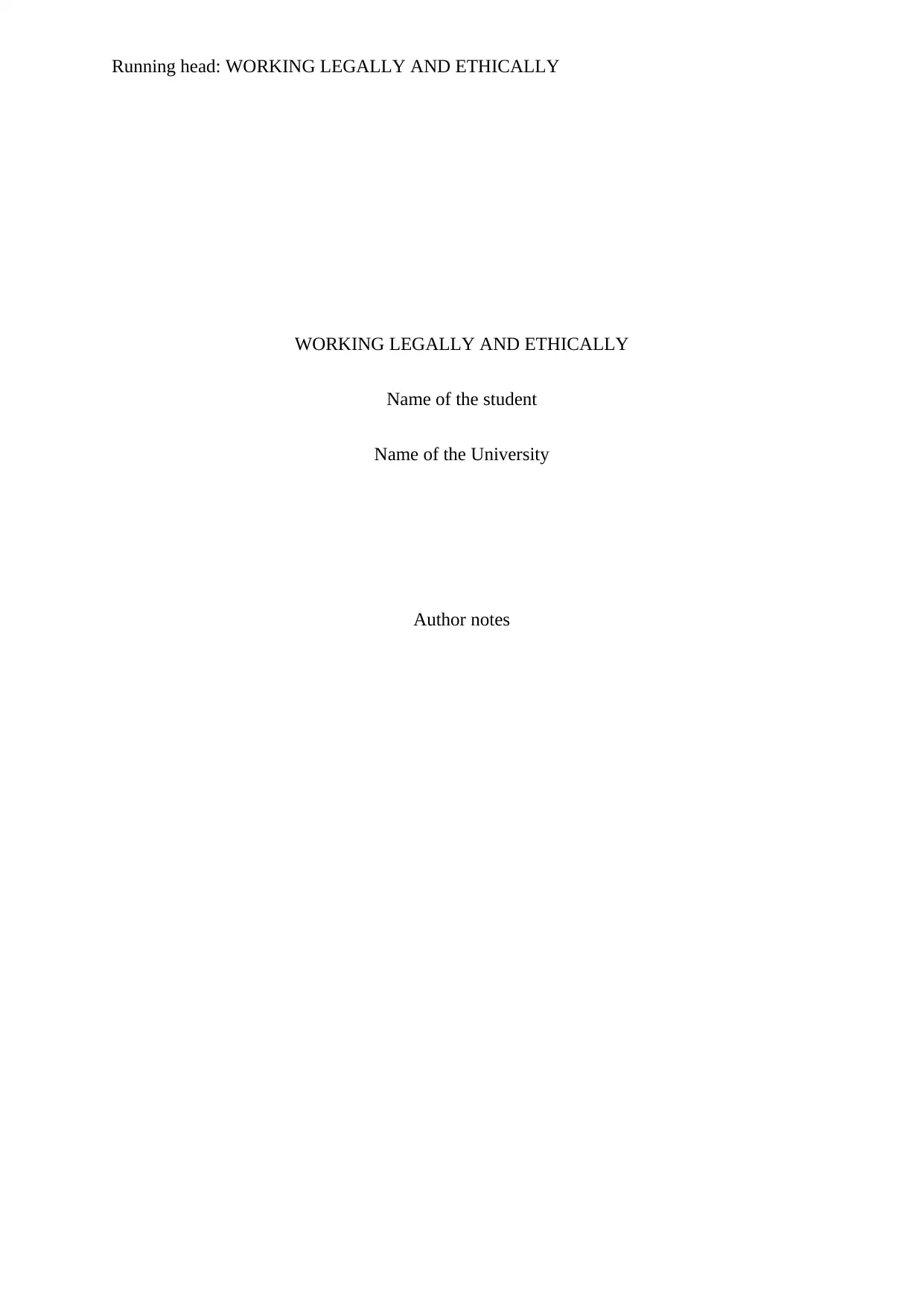
Running head: WORKING LEGALLY AND ETHICALLY
WORKING LEGALLY AND ETHICALLY
Name of the student
Name of the University
Author notes
WORKING LEGALLY AND ETHICALLY
Name of the student
Name of the University
Author notes
Paraphrase This Document
Need a fresh take? Get an instant paraphrase of this document with our AI Paraphraser
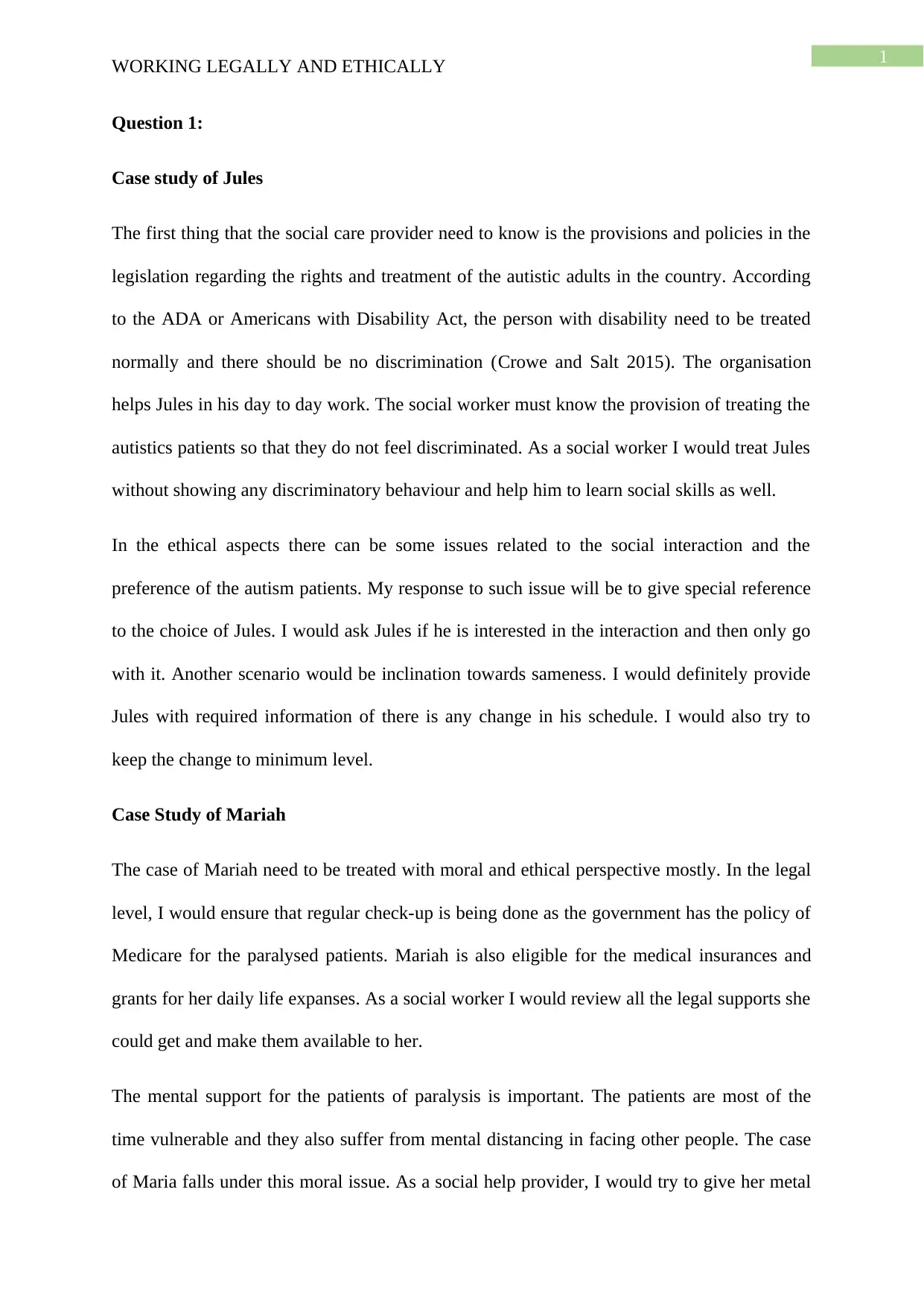
1
WORKING LEGALLY AND ETHICALLY
Question 1:
Case study of Jules
The first thing that the social care provider need to know is the provisions and policies in the
legislation regarding the rights and treatment of the autistic adults in the country. According
to the ADA or Americans with Disability Act, the person with disability need to be treated
normally and there should be no discrimination (Crowe and Salt 2015). The organisation
helps Jules in his day to day work. The social worker must know the provision of treating the
autistics patients so that they do not feel discriminated. As a social worker I would treat Jules
without showing any discriminatory behaviour and help him to learn social skills as well.
In the ethical aspects there can be some issues related to the social interaction and the
preference of the autism patients. My response to such issue will be to give special reference
to the choice of Jules. I would ask Jules if he is interested in the interaction and then only go
with it. Another scenario would be inclination towards sameness. I would definitely provide
Jules with required information of there is any change in his schedule. I would also try to
keep the change to minimum level.
Case Study of Mariah
The case of Mariah need to be treated with moral and ethical perspective mostly. In the legal
level, I would ensure that regular check-up is being done as the government has the policy of
Medicare for the paralysed patients. Mariah is also eligible for the medical insurances and
grants for her daily life expanses. As a social worker I would review all the legal supports she
could get and make them available to her.
The mental support for the patients of paralysis is important. The patients are most of the
time vulnerable and they also suffer from mental distancing in facing other people. The case
of Maria falls under this moral issue. As a social help provider, I would try to give her metal
WORKING LEGALLY AND ETHICALLY
Question 1:
Case study of Jules
The first thing that the social care provider need to know is the provisions and policies in the
legislation regarding the rights and treatment of the autistic adults in the country. According
to the ADA or Americans with Disability Act, the person with disability need to be treated
normally and there should be no discrimination (Crowe and Salt 2015). The organisation
helps Jules in his day to day work. The social worker must know the provision of treating the
autistics patients so that they do not feel discriminated. As a social worker I would treat Jules
without showing any discriminatory behaviour and help him to learn social skills as well.
In the ethical aspects there can be some issues related to the social interaction and the
preference of the autism patients. My response to such issue will be to give special reference
to the choice of Jules. I would ask Jules if he is interested in the interaction and then only go
with it. Another scenario would be inclination towards sameness. I would definitely provide
Jules with required information of there is any change in his schedule. I would also try to
keep the change to minimum level.
Case Study of Mariah
The case of Mariah need to be treated with moral and ethical perspective mostly. In the legal
level, I would ensure that regular check-up is being done as the government has the policy of
Medicare for the paralysed patients. Mariah is also eligible for the medical insurances and
grants for her daily life expanses. As a social worker I would review all the legal supports she
could get and make them available to her.
The mental support for the patients of paralysis is important. The patients are most of the
time vulnerable and they also suffer from mental distancing in facing other people. The case
of Maria falls under this moral issue. As a social help provider, I would try to give her metal
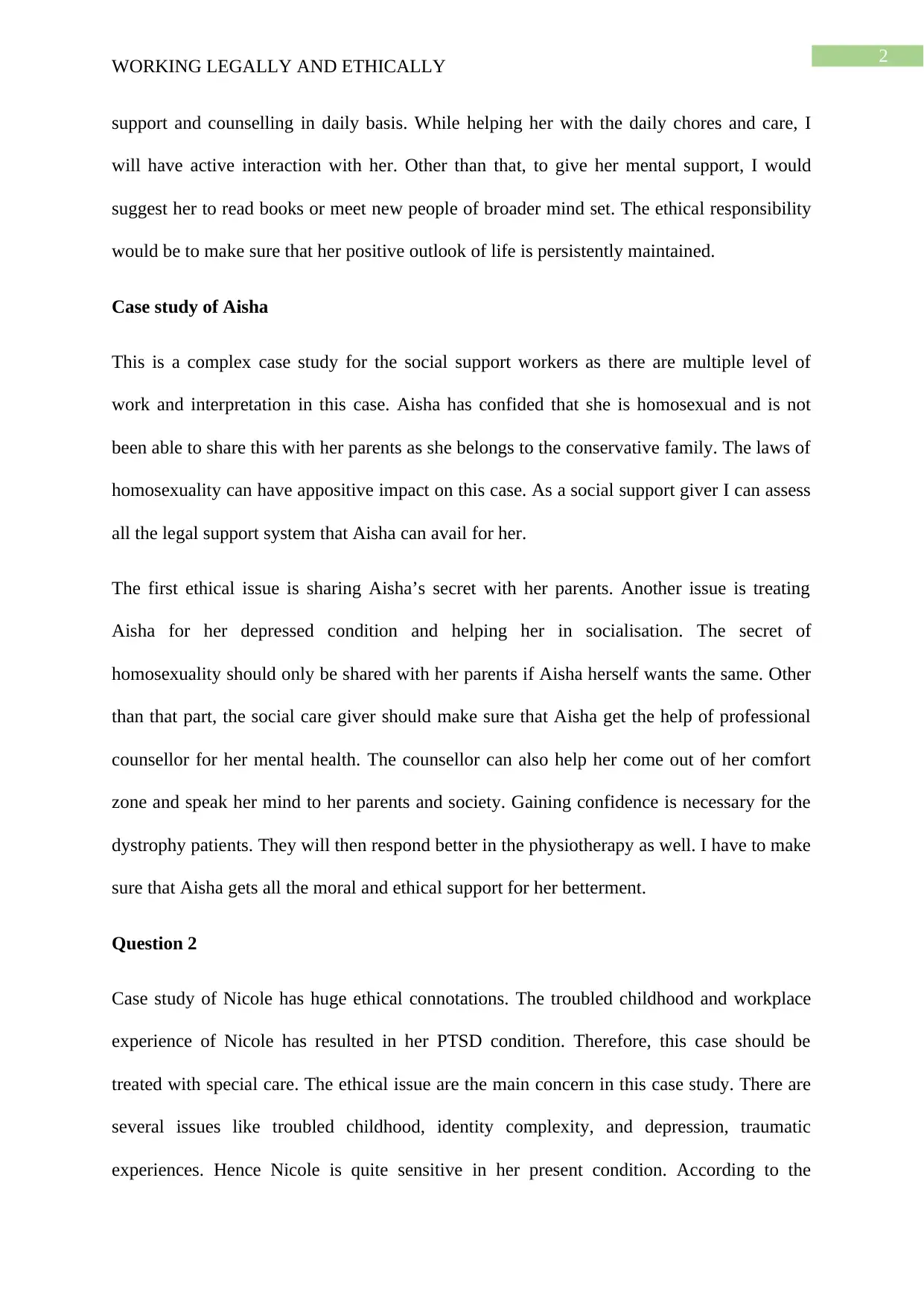
2
WORKING LEGALLY AND ETHICALLY
support and counselling in daily basis. While helping her with the daily chores and care, I
will have active interaction with her. Other than that, to give her mental support, I would
suggest her to read books or meet new people of broader mind set. The ethical responsibility
would be to make sure that her positive outlook of life is persistently maintained.
Case study of Aisha
This is a complex case study for the social support workers as there are multiple level of
work and interpretation in this case. Aisha has confided that she is homosexual and is not
been able to share this with her parents as she belongs to the conservative family. The laws of
homosexuality can have appositive impact on this case. As a social support giver I can assess
all the legal support system that Aisha can avail for her.
The first ethical issue is sharing Aisha’s secret with her parents. Another issue is treating
Aisha for her depressed condition and helping her in socialisation. The secret of
homosexuality should only be shared with her parents if Aisha herself wants the same. Other
than that part, the social care giver should make sure that Aisha get the help of professional
counsellor for her mental health. The counsellor can also help her come out of her comfort
zone and speak her mind to her parents and society. Gaining confidence is necessary for the
dystrophy patients. They will then respond better in the physiotherapy as well. I have to make
sure that Aisha gets all the moral and ethical support for her betterment.
Question 2
Case study of Nicole has huge ethical connotations. The troubled childhood and workplace
experience of Nicole has resulted in her PTSD condition. Therefore, this case should be
treated with special care. The ethical issue are the main concern in this case study. There are
several issues like troubled childhood, identity complexity, and depression, traumatic
experiences. Hence Nicole is quite sensitive in her present condition. According to the
WORKING LEGALLY AND ETHICALLY
support and counselling in daily basis. While helping her with the daily chores and care, I
will have active interaction with her. Other than that, to give her mental support, I would
suggest her to read books or meet new people of broader mind set. The ethical responsibility
would be to make sure that her positive outlook of life is persistently maintained.
Case study of Aisha
This is a complex case study for the social support workers as there are multiple level of
work and interpretation in this case. Aisha has confided that she is homosexual and is not
been able to share this with her parents as she belongs to the conservative family. The laws of
homosexuality can have appositive impact on this case. As a social support giver I can assess
all the legal support system that Aisha can avail for her.
The first ethical issue is sharing Aisha’s secret with her parents. Another issue is treating
Aisha for her depressed condition and helping her in socialisation. The secret of
homosexuality should only be shared with her parents if Aisha herself wants the same. Other
than that part, the social care giver should make sure that Aisha get the help of professional
counsellor for her mental health. The counsellor can also help her come out of her comfort
zone and speak her mind to her parents and society. Gaining confidence is necessary for the
dystrophy patients. They will then respond better in the physiotherapy as well. I have to make
sure that Aisha gets all the moral and ethical support for her betterment.
Question 2
Case study of Nicole has huge ethical connotations. The troubled childhood and workplace
experience of Nicole has resulted in her PTSD condition. Therefore, this case should be
treated with special care. The ethical issue are the main concern in this case study. There are
several issues like troubled childhood, identity complexity, and depression, traumatic
experiences. Hence Nicole is quite sensitive in her present condition. According to the
⊘ This is a preview!⊘
Do you want full access?
Subscribe today to unlock all pages.

Trusted by 1+ million students worldwide
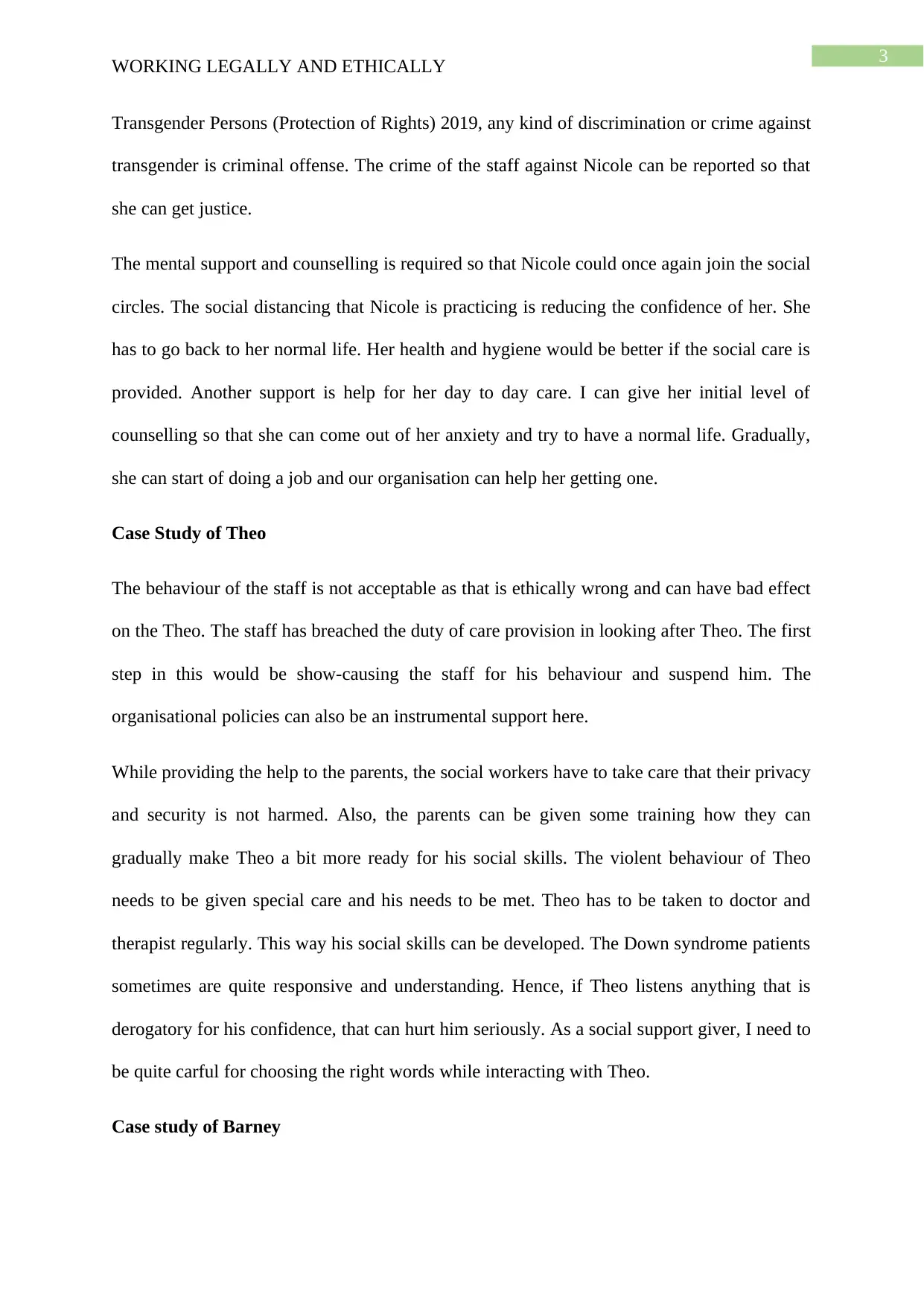
3
WORKING LEGALLY AND ETHICALLY
Transgender Persons (Protection of Rights) 2019, any kind of discrimination or crime against
transgender is criminal offense. The crime of the staff against Nicole can be reported so that
she can get justice.
The mental support and counselling is required so that Nicole could once again join the social
circles. The social distancing that Nicole is practicing is reducing the confidence of her. She
has to go back to her normal life. Her health and hygiene would be better if the social care is
provided. Another support is help for her day to day care. I can give her initial level of
counselling so that she can come out of her anxiety and try to have a normal life. Gradually,
she can start of doing a job and our organisation can help her getting one.
Case Study of Theo
The behaviour of the staff is not acceptable as that is ethically wrong and can have bad effect
on the Theo. The staff has breached the duty of care provision in looking after Theo. The first
step in this would be show-causing the staff for his behaviour and suspend him. The
organisational policies can also be an instrumental support here.
While providing the help to the parents, the social workers have to take care that their privacy
and security is not harmed. Also, the parents can be given some training how they can
gradually make Theo a bit more ready for his social skills. The violent behaviour of Theo
needs to be given special care and his needs to be met. Theo has to be taken to doctor and
therapist regularly. This way his social skills can be developed. The Down syndrome patients
sometimes are quite responsive and understanding. Hence, if Theo listens anything that is
derogatory for his confidence, that can hurt him seriously. As a social support giver, I need to
be quite carful for choosing the right words while interacting with Theo.
Case study of Barney
WORKING LEGALLY AND ETHICALLY
Transgender Persons (Protection of Rights) 2019, any kind of discrimination or crime against
transgender is criminal offense. The crime of the staff against Nicole can be reported so that
she can get justice.
The mental support and counselling is required so that Nicole could once again join the social
circles. The social distancing that Nicole is practicing is reducing the confidence of her. She
has to go back to her normal life. Her health and hygiene would be better if the social care is
provided. Another support is help for her day to day care. I can give her initial level of
counselling so that she can come out of her anxiety and try to have a normal life. Gradually,
she can start of doing a job and our organisation can help her getting one.
Case Study of Theo
The behaviour of the staff is not acceptable as that is ethically wrong and can have bad effect
on the Theo. The staff has breached the duty of care provision in looking after Theo. The first
step in this would be show-causing the staff for his behaviour and suspend him. The
organisational policies can also be an instrumental support here.
While providing the help to the parents, the social workers have to take care that their privacy
and security is not harmed. Also, the parents can be given some training how they can
gradually make Theo a bit more ready for his social skills. The violent behaviour of Theo
needs to be given special care and his needs to be met. Theo has to be taken to doctor and
therapist regularly. This way his social skills can be developed. The Down syndrome patients
sometimes are quite responsive and understanding. Hence, if Theo listens anything that is
derogatory for his confidence, that can hurt him seriously. As a social support giver, I need to
be quite carful for choosing the right words while interacting with Theo.
Case study of Barney
Paraphrase This Document
Need a fresh take? Get an instant paraphrase of this document with our AI Paraphraser
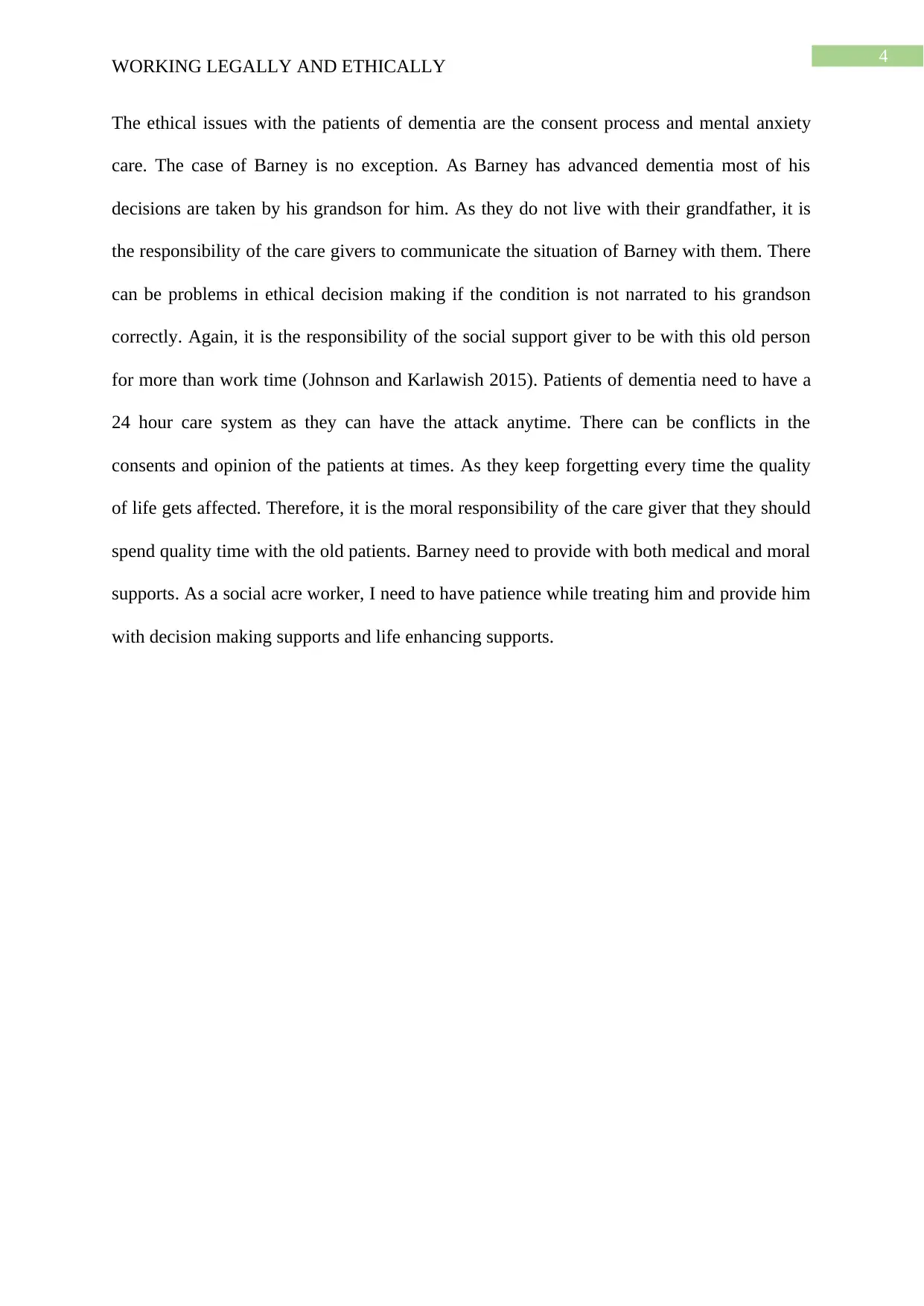
4
WORKING LEGALLY AND ETHICALLY
The ethical issues with the patients of dementia are the consent process and mental anxiety
care. The case of Barney is no exception. As Barney has advanced dementia most of his
decisions are taken by his grandson for him. As they do not live with their grandfather, it is
the responsibility of the care givers to communicate the situation of Barney with them. There
can be problems in ethical decision making if the condition is not narrated to his grandson
correctly. Again, it is the responsibility of the social support giver to be with this old person
for more than work time (Johnson and Karlawish 2015). Patients of dementia need to have a
24 hour care system as they can have the attack anytime. There can be conflicts in the
consents and opinion of the patients at times. As they keep forgetting every time the quality
of life gets affected. Therefore, it is the moral responsibility of the care giver that they should
spend quality time with the old patients. Barney need to provide with both medical and moral
supports. As a social acre worker, I need to have patience while treating him and provide him
with decision making supports and life enhancing supports.
WORKING LEGALLY AND ETHICALLY
The ethical issues with the patients of dementia are the consent process and mental anxiety
care. The case of Barney is no exception. As Barney has advanced dementia most of his
decisions are taken by his grandson for him. As they do not live with their grandfather, it is
the responsibility of the care givers to communicate the situation of Barney with them. There
can be problems in ethical decision making if the condition is not narrated to his grandson
correctly. Again, it is the responsibility of the social support giver to be with this old person
for more than work time (Johnson and Karlawish 2015). Patients of dementia need to have a
24 hour care system as they can have the attack anytime. There can be conflicts in the
consents and opinion of the patients at times. As they keep forgetting every time the quality
of life gets affected. Therefore, it is the moral responsibility of the care giver that they should
spend quality time with the old patients. Barney need to provide with both medical and moral
supports. As a social acre worker, I need to have patience while treating him and provide him
with decision making supports and life enhancing supports.
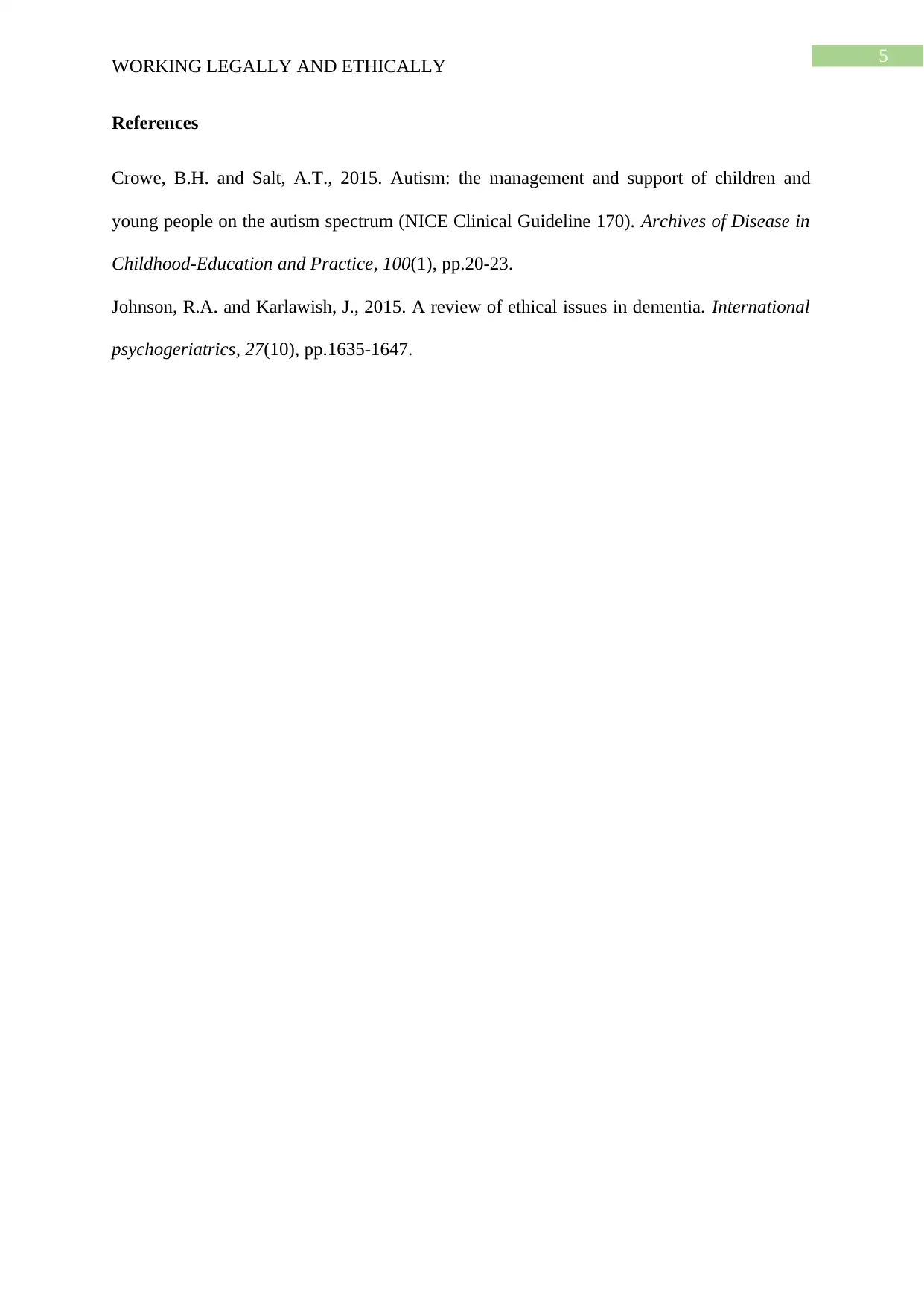
5
WORKING LEGALLY AND ETHICALLY
References
Crowe, B.H. and Salt, A.T., 2015. Autism: the management and support of children and
young people on the autism spectrum (NICE Clinical Guideline 170). Archives of Disease in
Childhood-Education and Practice, 100(1), pp.20-23.
Johnson, R.A. and Karlawish, J., 2015. A review of ethical issues in dementia. International
psychogeriatrics, 27(10), pp.1635-1647.
WORKING LEGALLY AND ETHICALLY
References
Crowe, B.H. and Salt, A.T., 2015. Autism: the management and support of children and
young people on the autism spectrum (NICE Clinical Guideline 170). Archives of Disease in
Childhood-Education and Practice, 100(1), pp.20-23.
Johnson, R.A. and Karlawish, J., 2015. A review of ethical issues in dementia. International
psychogeriatrics, 27(10), pp.1635-1647.
⊘ This is a preview!⊘
Do you want full access?
Subscribe today to unlock all pages.

Trusted by 1+ million students worldwide
1 out of 6
Related Documents
Your All-in-One AI-Powered Toolkit for Academic Success.
+13062052269
info@desklib.com
Available 24*7 on WhatsApp / Email
![[object Object]](/_next/static/media/star-bottom.7253800d.svg)
Unlock your academic potential
Copyright © 2020–2026 A2Z Services. All Rights Reserved. Developed and managed by ZUCOL.





